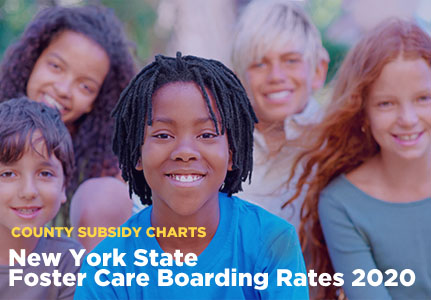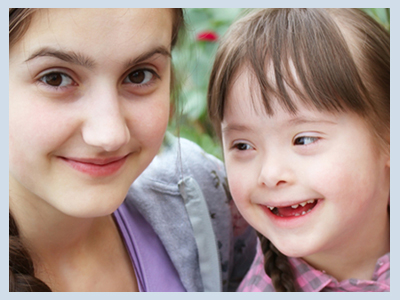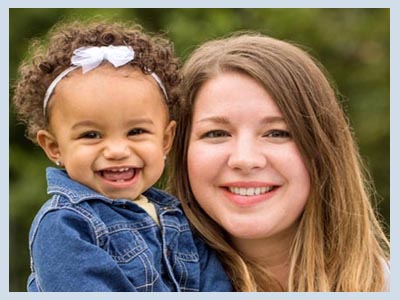Foster Care Financial Supports
How do I support a foster child financially?
Foster parents are entitled to a monthly payment allowance intended to help them cover a portion of the costs incurred by caring for children in their home.
New York Foster Care Board and Care Rates
The annual board rate, which is set according to the child’s age, is intended to reimburse foster parents for the cost of caring for the child. Foster parents receive schedules for the current board rate and for payment standards. County departments of social services set their own rates up to the maximum allowed.
Click here for more information and current 2020 Foster Care Boarding Rates.
There are three foster care payment categories for foster boarding homes: basic, special, and exceptional.
Basic foster care payments are made to foster parents who provide care for a child who has no identified special or exceptional needs.
Within 30 days of placement, your local agency may designate the child’s needs as basic, special or exceptional. A designation can be changed at any point during placement as the child’s needs change.
To receive special or exceptional foster care payments, you will need to show your ability to care for children with special or exceptional needs through past training/experience or by completing special training. You will need to participate in agency training every year and actively partake in case conferences. You must be able to work with the professionals involved in the child’s treatment plan, and to accept assistance and guidance in caring for the child.
Special and exceptional rates need to be approved by the local department of social services. Either a caseworker or a foster parent can submit a request for the special or exceptional rate. If the level of difficulty changes (decreases or increases) due to the child’s need for care and supervision, the board rate will also change. The services expected of the foster parents will also change.
Information about these designations can be obtained from your local department of social services.
Therapeutic Foster Boarding Home Eligibility
Some agencies and local departments of social services allow for approved therapeutic foster boarding homes. These homes provide intensive care to certain behaviorally or emotionally disturbed foster children. These foster parents receive enhanced services from a foster care agency as well as specialized, ongoing training.
Clothing Allowances
Departments of social services set their own clothing allowance rates up to the maximum allowed. A regular clothing allowance, based on the child’s maximum age, is included with the board rate and is part of the monthly payment. An emergency clothing allowance may be obtained in special situations. If approved, an initial clothing allowance is available for the child at the time of initial placement.
Any clothing purchased for a child in care belongs to the child and should be taken along whenever s/he moves or is returned home. It is expected that a child will leave with sufficient and clean clothes.
A diaper allowance is automatically authorized for children from birth through 3 years of age. If a child younger than 4 years of age is toilet trained and no longer needs diapers, the foster parents should tell the caseworker. In such cases the diaper allowance will be discontinued. If a child only needs diapers during the night, a partial diaper allowance can be authorized. Medical documentation of need is necessary to continue a diaper allowance for a child past the age of 4.
Child Care
Some departments of social services may make payments for day care, when necessary, for the care and supervision of foster children if the foster parent is employed full-time or part-time. Child care expenses for purposes other than employment are the foster parent’s responsibility. However, foster parents may be reimbursed for child care if attending training.
For additional information about day care for foster parents, please contact your local department of social services.
Information about child care in New York State is available on the OCFS website.
Transportation
The board and care rate includes the transportation costs.Reimbursement rates for transportation are set by the county for the following: foster parents’ visits to staff of an authorized agency, foster child’s visits to parents and siblings living with relatives or in a different foster or adoptive home, and meetings about the child. For children with the goal to return home, the agency must provide transportation assistance (if necessary) to make visits with their parent(s) possible at least every two weeks.
Reimbursement rates for travel to birth parents, legal guardians, other relatives, or significant others who visit children in foster care may be paid at a rate set by the county. Additional information on transportation for medical reasons is available through your local department of social services.
School-Related Expenses
School expenses such as books, activity fees, field trips, school club dues, and art supplies may be reimbursed. Special attire for senior proms, graduation, school jewelry or pictures, or religious ceremonies may also be reimbursed.
Tutoring expenses may be reimbursed if the service is remedial, requested in writing by the school and not available from any other source. Special recreational/hobby/extracurricular activity expenditures may be reimbursed. This includes music, art, and/or dancing lessons not provided in school, and the purchase or rental of equipment; and membership and participation in organized groups, such as the Y, Scouts or Little League.
Camp Fees
Day camp or residential summer camp costs including registration and transportation expenses may be authorized.
Damage or Loss of Property
Some agencies may consider compensation to foster parents for damage and/or loss of personal property caused by a child in their care if the costs are not covered by the foster parents’ insurance.
Miscellaneous Expenses
Extraordinary communication expenses for a child in care to maintain telephone contact with his or her parents and/or siblings may be reimbursed.
Additional Outside Links, Resources and Information
- New York State Local District Basic, Special, and Exceptional Rates as of October 2009 (pdf)
- New York State Local District Clothing Allowance and Miscellaneous Rates (pdf)
- Current Foster Care and Group Home Rates Paid to Voluntary Agencies (pdf)
- New York State Maximum Reimbursement Rates
- 15-OCFS ADM-11 – Maximum State Aid Rates Foster Care and Residential Programs, 7/1/15-3/31/16
- Excerpt OCFS Standards of Payment for Foster Care Manual (pdf)
- 08-OCFS ADM-03 Required Notice to Foster Parent of Level of Care and Payment (pdf)
- Form LDSS 7018 for Notification of Foster Care Level of Care and Payment (pdf)
- Hitting the M.A.R.C.: Establishing Foster Care Minimum Adequate
Below you will find information about room and board rates in New York State, tax issues and liability insurance.
Considering Foster Care & Adoption Subsidy Payments as Income
Foster Care boarding home and adoption subsidy maintenance payments are not considered as family income for income tax purposes, but either may be considered as income for other purposes such as determining eligibility for subsidized housing.
New York State Foster Care Boarding Rates 2020
2020 Foster Care subsidy payments for basic rates, special rates, exceptional rates, clothing replacement and diaper allowances broken down by county throughout New York State.
New York State Foster Care Rate Policy
Foster Care boarding home rates differ significantly in New York’s 58 social services districts as each local district (LDSS) or county is allowed to set its own rates. The state only determines the maximum amounts it will reimburse to the local districts as each local district is allowed to set its own rates within state guidelines.
New York State Foster Care Clothing Allowance Guidelines
oster care, the social services district shall: determine clothing needs upon admission to care; and authorize allowances to buy necessary clothing.
Claiming Children in Foster Care Care on Your Taxes
This page contains information about federal guidelines for claiming a child placed in your homes on your taxes and explains the process for requesting a child’s security number from your local department of social services or the Administration for Children’s Services (ACS).
Special & Exceptional Foster Care Board Rates in New York
The following information summarizes the regulations for special and exceptional rate eligibility, pursuant to New York State Department of Social Services regulations, Sections 427.2, 427.6, and 427.15. The regulations were effective August 1990.
Foster Parent Liability Insurance
The Coalition supports implementation of a liability and property damage insurance package to protect foster parents from liability for acts of the child in care and for suits brought by the biological parent, the child, or others arising out of the foster parent/child relationship.
Liability Insurance/Damage Claims for Foster Parents
The National Foster Parent Association (NFPA) issues the following position statement: NFPA supports implementation of a liability and property damage insurance package to protect foster parents from liability for acts of the child in care and for suits brought by the biological parent, the child, or others arising out of the foster parent/child relationship.








